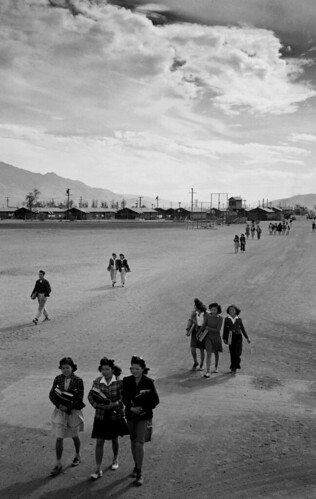
Japanese-American relocation camp during World War 2
One of my blogging colleagues, Findalis, of "Monkey in the Middle" (linked), in her Pearl Harbor remembrance, also pointed out another aspect to our war against Japan that should not be forgotten. That is the re-location of Japanese-Americans from the West Coast and the exploits of the 442nd-an Army unit that fought in Europe that was made up entirely of Japanese-Americans.
After Pearl Harbor, there was a fear that the large presence of Japanese-Americans on the West Coast might represent a 5th column. Anti-Japanese fever was at a high pitch in those days. In February 1942, President Roosevelt issued Executive Order 9066, which resulted in Japanese-Americans living on the West Coast being shipped to inland relocation centers, principally in the wide open western states. It did not matter whether they were first-generation immigrants or born in the US and possessed American citizenship. Though the treatment was as humane as possible, the conditions in these camps in places like Manzanar, California (in the desert), Topaz, Utah, Gila, Arizona, and Heart Mountain, Wyoming, were harsh.
What also happened is that thousands of Japanese-Americans lost their property and businesses. Most never recovered their possessions after the war, yet they remained what they had been all along-loyal Americans. (About a decade ago, surviving relocatees were granted reparations in the amount of $20,000.)
And who was one of the leading proponents and agitators for the relocation? None other than the then-Attorney General of California and later Governor, Earl Warren, the icon of the left after he ascended to the Supreme Court. Years after he left the Court, Warren never apologized for his actions that helped lead to the relocations. On at least one occasion, Warren was due to speak at a California University, and Asian-American students announced that they would respectfully ask him to explain his position in those years. Warren cancelled one such appearance, and on another occasion, told the students that they should direct their questions to the Federal Government, which carried out the policy.
The other part of this chapter in our history is the actions of the 442nd Infantry Combat Team, which fought for America in Europe and was the most-highly decorated unit (per capita size) in World War 2. They had volunteered to serve the country which was imprisoning them and their families and fought with incredible bravery and distinction. They called themselves, "Buddha Heads", a term that I grew up with in Los Angeles after the war.
Being from West Los Angeles, I grew up with and went to school with lots of Japanese-Americans. This was only 10-20 years after the end of the war. The Japanese-American kids were totally assimilated and mixed freely with white friends. Interracial dating was common-and would become more common as the years passed by. In fact, it was considered sort of "fashionable", if that is the right word, for a white girl to have a Japanese-American boyfriend. As I said above, we referred to the Japanese-American kids as "Buddha Heads." It was not a pejorative; it was a term they used to refer to themselves. My point in all this is to illustrate how quickly Japanese-Americans (at least on the surface) overcame the feelings from the war. The experiences of their families was a subject we never discussed with each other in our high school years. (If you are wondering, almost all Asian-Americans in West LA at that time were of Japanese descent. Those of Filipino, Chinese, Korean descent, etc. were not too common in West LA at that time.)
None of the above is to diminish the importance of Pearl Harbor as a symbol. To visit the site of the USS Arizona is an unforgettable experience. We must never forget Pearl Harbor, but it should never color our perceptions of any other American. Of course, we have reconciliated with the nation of Japan and anti-Japanese feelings that were so strong after Pearl Harbor have faded and died out. We should, however, also never forget that American citizens of Japanese ancestry were treated unfairly.
Finally, there were, to my knowledge, no documented cases of treason or sedition by any Japanese-American. (The Tokyo Rose case involved a young Japanese-American woman who found herself in Japan at the outbreak of the war.)





























.jpg)









.jpg)




































































.jpg)

.jpg)











.jpg)



















GO FOR BROKE!!!
ReplyDeleteIndeed these truest of American's proved their undying loyalty, repose, dignity, and engineuity!!
They proved their patriotism through the hard unrelenting and punishing fight they showed the Fascist's.
Instead of wallowing in self-despair which, I might add they would've had every right to do so. They didn't. They after being released penniless due to having all their worldly pocession's, property, jobs, money, and literally their entire lives stolen from them. They rolled up their sleeves and worked their fingers to the bone.
Amassing more material wealth, power, and across the board success's. That made their previous holding's, miniscule in comparison. And enough political and business clout to make them completely untouchable by the racist's who once victimized them!!